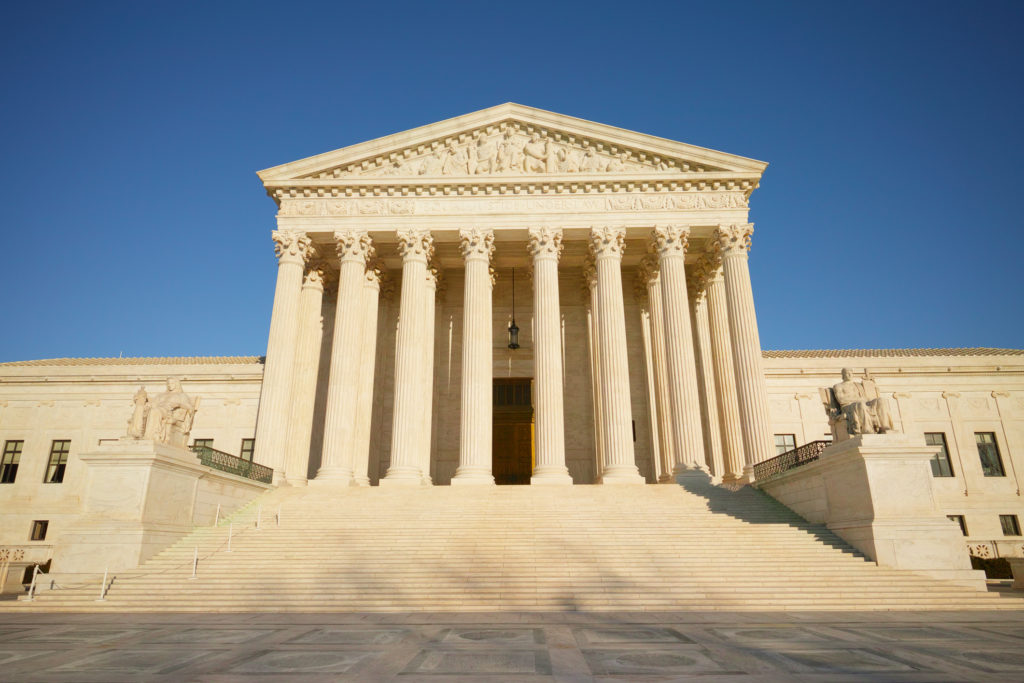Jim Sonne and Zeba Huq Weigh In on Religious Liberty and Domestic Violence in Travel Ban
The Supreme Court on Monday again weighed in on President Trump’s executive action restricting travel from certain Muslim-majority countries, allowing the most recent (and third) iteration of his order on the topic to go into effect temporarily while the lower courts consider it. No matter the stage of litigation, however, the legal and public debate will likely continue to focus on whether controversial comments by the president relating to the travel orders yet absent from the text nonetheless render them improper forms of religious discrimination. But there is no need to look beyond the documents themselves to be troubled on that front. For although Muslims are nowhere referred to by name, the orders appear to make them their object in a particularly misplaced and inflammatory way: in their curious call for a study on “so-called ‘honor killings’” in the United States.

Specifically, in the course of an effort otherwise devoted to travel and asylum and premised on international-security concerns, the second version of the order — in a section left in force by the third — commissions a government report on “the number and types of acts of gender-based violence against women, including so-called ‘honor killings,’ in the United States by foreign nationals.” But no factual predicate is offered, no connection to urgent travel issues is described; indeed, the called-for study is limited to domestic crimes. And while any such violence — typically characterized by the perpetrator thinking the female victim has brought shame upon her family — should be condemned in no uncertain terms wherever and by whomever it arises, its cameo appearance in the travel orders seems suspect in both context and the light of history.

As a group of social scientists urged in a recent brief to the Supreme Court, even though honor-based violence is a tragic reality in many cultures and nations its invocation in our contemporary political discourse has come to be associated almost exclusively and unfairly with Muslims as a group. Much of this stems from the rise of the “anti-Shariah” movement, which views Islam as an ideology incompatible with Western civilization and whose inclusion in the American fabric will lead to theocracy. In addition to immigration limits, the movement has called for prohibitions on the domestic use of religious law — notably, Islamic — even though, as we have described elsewhere, such law is common in many faiths and, unlike in other countries, its application here is limited almost entirely to private affairs.
In any event, and as a 2015 report sponsored by the U.S. Justice Department already has found, domestic acts of honor violence are largely anecdotal and “rare in comparison to other types of crime in the United States” — hardly the stuff to justify their inclusion in an emergency and categorical travel order.
Moreover, when it comes to immigrant groups, research summarized by the Cato Institute shows immigrants are no more prone to criminal activity than native-born Americans. And regarding Muslims in particular, a recent survey by the Institute for Social Policy and Understanding indicates that domestic violence is less prevalent in the Muslim American community than the general public.
The targeting of faith communities in the immigration context — whether direct or veiled — is unfortunately not a new phenomenon in America, despite our otherwise proud history of religious liberty. Catholics, Jews and Mormons, for example, have all faced pernicious generalizations to restrict their entry in past eras. Indeed, each group was at one time or another thought to hold beliefs antithetical to Western values, considered to be loyal to a foreign ideology, and seen as degenerates or worse. For instance, in the late 19th century, the U.S. secretary of state directed diplomatic officers to restrict the flow of Mormons from Europe. A turn-of-the-century study commissioned by Congress likewise peddled stereotypes of Jews and Catholics, leading to laws blocking their influx in the 1920s.

As the Supreme Court has made clear, however, the First Amendment protects against government hostility to religion that is “masked, as well as overt.” Even valid concerns about public safety can result in illicit discrimination where the text, operation and context of a law — despite appearing to be neutral on its face — are misplaced to the detriment of a particular faith. Indeed, it has historically been in safety and security contexts, where sentiment is high and unequivocal, that the risk of overreach is acute. But to echo the Rev. Martin Luther King Jr., the measure of a society is not where it stands “in moments of comfort and convenience, but … at times of challenge and controversy.”
We have plenty of work to do to rid our society of the plague of violence against women, as shown by the recent spotlight on a culture of sexual harassment at the highest levels of power. And honor violence in particular must be condemned and eradicated — and to that end, be studied. But this should be done independently and universally, and not in the fuzzy, misplaced, and provocative way the travel orders suggest.
No matter the result of the litigation at the Supreme Court, the Court of Appeals for the Ninth Circuit, or elsewhere, we can and should insist on the type of thoughtful and tailored balancing of safety and religious liberty that has ultimately, if belatedly, prevailed in the past — and to the benefit of all.
James A. Sonne is an associate professor at Stanford Law School and directs its Religious Liberty Clinic; Zeba A. Huq is a lecturer in law and supervising attorney in the clinic.
(This op-ed originally appeared in the San Francisco Chronicle on December 6, 2017.)
